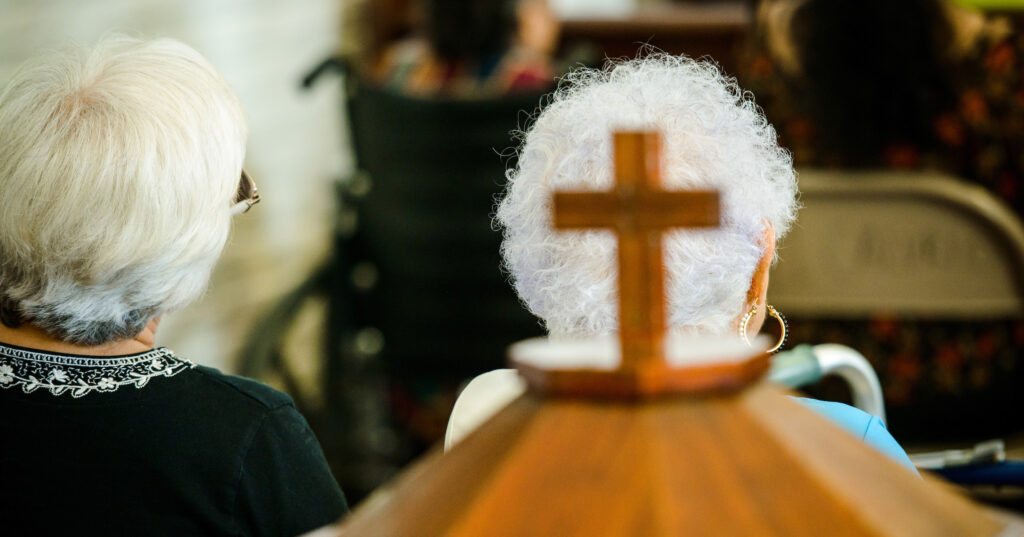The following sermon was preached by the Rev. Sean Daenzer in the LCMS International Center Chapel on Sept. 13, 2023. The text was Galatians 5:16–24.
+In the Name of the Father, and of the Son, and of the Holy Spirit+
In the Divine Service, when the Epistle is read, it is customary to address the congregation. When reading the epistles of St. Paul, the reader adds, if necessary, the word “brothers,” referring to the gathered congregation. If today’s reading had started earlier or later, we would not need to add the word “brothers,” since Paul is constantly using it. In the epistles of St. John and St. Peter, “beloved” is the traditional form of address — for John in particular, it is fitting. This is where our beloved brother William Weedon also gets his signature phrase, “people loved by God.” In sermons, besides “dearly beloved,” it is most common to say something like “dear saints.”
We do not say “dear sinners.”
Doctor Luther, in his highly rhetorical way of speaking — and very often in the first person — is not afraid to address himself as “sinner.” He would call people rapscallions and knaves, I suppose like Paul saying “O ye foolish Galatians.” But it is decidedly not our custom to address the gathered congregation as “sinners.”
You are my brothers, because you are Christ’s brothers by blood. No matter how angry or rhetorical Paul is in this famously direct letter, he begins with words of grace and peace to the churches and to the brothers from God the Father and the Lord Jesus Christ, who gave Himself for our sins to deliver us from the present evil age according to the will of our God and Father. So, then, yes, it is our custom to sing, “I a sinner come to Thee,” and, “There’s nothing that can ever this ransomed sinner sever,” and certainly to say, “I, a poor miserable sinner, confess …”; but it is not our custom to make “sinner” the mindset and status of your identification.
You are those for whom the Son gave Himself. You are the people loved by God. You are those who live by the Spirit who belong to Christ Jesus. Something may certainly be said about your sins and about your flesh, but they are not to become your mindset or status identification. The Son did not give Himself to let you remain in them, but to deliver you from them. They are not loved by God. They do not constitute your life, nor do you belong to them.
This is all important to mention because of what Paul describes today: how the desires of the flesh remain, and how the desires of the Spirit are opposed to them to keep us from doing those things we, that is our flesh, might want to do. Often this is taught with the saying that we are “simultaneously saint and sinner,” which is a way of capturing what Paul teaches — but only the sort of capture an old shutter camera could make: a single, frozen still-frame.
What Paul describes today is quite active, as is the way Luther taught also. The Christian walk is not a contentment and resignation to such a split personality as one who is “fleshly, but no big deal, because also ‘spiritual.’” By no means. The Spirit and flesh are at war in us. And, unless you have believed in vain and unless Your Holy Christ in whom you rightly bear the name “saint” is not risen, the outcome of this war as a total victory over sin and death can never be uncertain.
By what means will the war be waged? It will not be waged by the Law, at least not the Law alone. To this the rest of Galatians is dedicated. The lengthy, varied and convicting list of ugly sins mixed with common attitudes is intended to convict us of our sins. God’s Law is against all of the attitudes and actions Paul lists. It is useful to call them out, convict us and call us to repent and change. It is able to show what God’s will is, which is particularly necessary when the will of the flesh is getting in the way again. But it is not capable of conquering that flesh or subduing it in any truthful way. It is not able to make the sinful flesh “holy” so that it begets holiness. Only the Spirit produces such holy attitudes and actions. That is why He is called the Holy, the sanctifying Spirit.
You are rightly addressed as “saints,” dearly beloved brothers and people loved by God. You are those who have received the Holy Spirit in Baptism, who gathers you as a Holy Christian Church, which is the communion of saints. And, of course, He makes you saints by the forgiveness of sins. I never address you brazenly as “sinners,” not because I believe you have made yourselves sinless; I refrain from this because I believe what our Lord has done for you, that your sins are forgiven for Christ’s sake, and that His Spirit is not dead or still in you.
If you have become obsessed with addressing yourself — or others — by the name of “sinner,” consider whether you have actually come under the Law. Identify your sins according to the Law; that is wise. But do not come to identify with them, or to come to that uneasy, static coexistence with the flesh. Sinners do not gladly confess their sins, nor crucify their flesh, nor inherit the kingdom of God. Only saints do such things. Only saints plead the Lord’s mercy. Only saints deny themselves, take up their cross and follow Him. Only saints, walking by the Holy Spirit, bear the fruits of faith. And such He has made you. In fact, even by my and Pastor Weedon’s saying so.
+In the Name of the Father, and of the Son, and of the Holy Spirit+
Photo: LCMS Communications/Erik M. Lunsford






This sermon is all glory theology. Per this saint’s ears.
Luther put it this way: “The saints in being righteous are at the same time sinners; they are righteous because they believe in Christ whose righteousness covers them and is imputed to them, but they are sinners because they do not fulfill the law and are not without sinful desires.” Which seems to contradict the sermon theme.